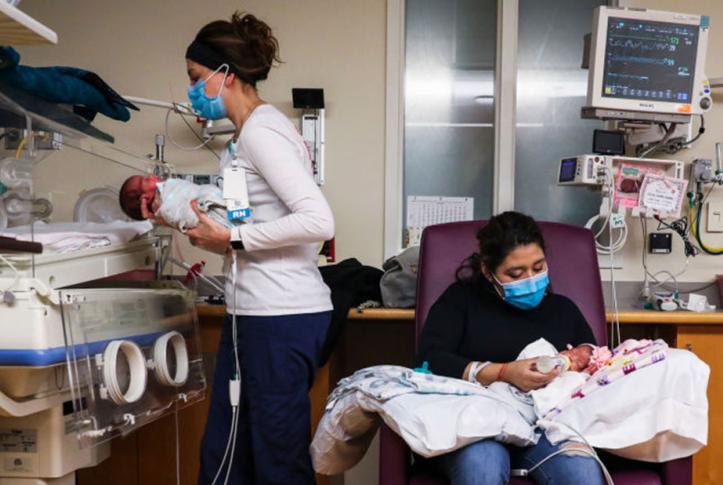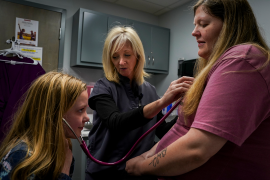Health care is on people’s minds as the general election approaches. It has historically been a top issue of interest for women voters. The Affordable Care Act (ACA) expanded women’s access to comprehensive coverage. Congress has failed to repeal the law, but the Trump administration is seeking to overturn it in a case before the Supreme Court. Meanwhile, the administration has promoted coverage options that are exempt from the ACA’s consumer protections, including short-term plans and health care sharing ministries (HCSMs). We examined the differences between ACA plans and these alternative coverage options for coverage of critical women’s health services.
To do so, we evaluated materials available to prospective enrollees to assess the adequacy of these products for women. For short-term plans, we looked at plan brochures for 12 of the best-selling products on eHealth in four states that have not established greater protections than the Trump administration’s lowered guardrails: Florida, Michigan, Pennsylvania, and Wisconsin. We also reviewed the member guidelines for four HCSMs sold nationwide: Samaritan Ministries, Medi-Share Christian Care Ministry, Christian Healthcare Ministries, and Liberty HealthShare.
Broad Insurance Coverage Is Vital to Women’s Health
Women use more health care than men. In addition to reproductive health care needs, such as contraception and maternity services, women are more likely to experience certain diseases, such as lung cancer, and are at a high risk for others, like cardiovascular disease. Thirty percent of nonelderly adult women have a preexisting condition that would make them ineligible for coverage without the ACA’s guarantee. Given these diverse needs, a broad array of health services is essential to women’s health and well-being.
The marketing materials for the short-term and HCSM plans only provide limited information on covered services. For example, some note that the plan covers prescriptions but do not provide a formulary. As a result, our analysis focused on broad categories of coverage:
- preventive services, such as contraceptives and screenings for cancer and other chronic conditions
- maternity care
- prescription drugs (because women are more likely to use prescription medications than men)
- mental health and substance use treatment (because women experience depression and anxiety at higher rates than men).
The ACA established minimum benefit requirements and other consumer protections that require coverage of these services. Many of these same services are equally critical for transgender men as well as some nonbinary people.
Plans Not Compliant with ACA Exclude or Limit Women’s Health Services
Short-Term Plans
All 12 short-term plans we reviewed exclude or severely limit the four key health services:
- At least six fail to cover all preventive services women with an ACA-compliant plan can obtain without cost sharing; five explicitly exclude contraceptive coverage.
- All 12 exclude maternity care.
- Nine exclude outpatient prescription drug coverage, including medications required to treat chronic conditions and some forms of contraception.
- At least eight exclude mental health care or substance-use disorder treatment or both.
Plan brochures often include incomplete coverage parameters and contradictory information, particularly about preventive services, making it difficult to know with certainty what is covered. And critically, plan brochures do not list the services that might not be covered as a result of medical underwriting, which allows insurers to exclude preexisting conditions from coverage.
The plans advertising coverage of any of the four services often impose strict limits, such as a $500 benefit maximum for nongeneric prescription drugs. Additionally, all 12 describe benefit limitations that are prohibited for ACA plans. This includes a lifetime or coverage-period dollar maximum, which could potentially leave women who undergo high-cost treatments with significant out-of-pocket costs. Further, all 12 plans exclude coverage of preexisting conditions, including potentially undiagnosed diseases like heart disease.
Health Care Sharing Ministries
HCSMs don’t guarantee payment for any health care claim, even those meeting member guidelines. Further, they offer limited financial protection for the four key services. Of the HCSMs we reviewed:
- All four fail to cover preventive services that women with ACA-compliant plans can obtain; all exclude contraceptive coverage.
- All four restrict eligibility for maternity services; members must be in a heterosexual marriage and enrolled prior to becoming pregnant. One excludes removal of an ectopic pregnancy even if it’s required to save the member’s life.
- All four exclude maintenance medications required for chronic conditions, limiting coverage to as few as 90 days; one only offers prescription drug coverage in its highest-cost plan.
- All four exclude mental health or substance-use disorder treatments except in very limited circumstances.
All four HCSMs include a dollar limit on costs — as low as $125,000 for all care associated with a diagnosis — that can be submitted for reimbursement. They all exclude coverage of preexisting conditions or impose a waiting period of up to 36 months.
Looking Ahead
The pandemic has brought about massive job loss that has fallen disproportionately on women, prompting many to lose job-based coverage and buy coverage on their own. The products available to women without employer plans vary drastically; only ACA plans have benefit standards that ensure comprehensive health care coverage for women. Women’s access to comprehensive coverage will depend greatly on whether ACA plans remain an available option.






